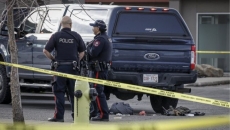A British Columbia man accused of a triple stabbing in Vancouver's Chinatown in September has lost his bid to seal a document that identified him as a "significant threat" before he was released from a forensic psychiatric hospital.
A B.C. Review Board panel said the presumption of the board's open process overrides Blair Donnelly's concerns that releasing the documents would invade his personal privacy or prejudice an upcoming trial.
News of Donnelly's history led to significant public attention, including Premier David Eby calling him "a violent, psychotic individual" and questioning how he was allowed to be released.
Eby appointed former Abbotsford, B.C., police chief Bob Rich to investigate the circumstances.
Media outlets, including The Canadian Press, argued against the proposed publication ban in a submission, but the panel said it was not necessary to reference those arguments because Donnelly wasn't able to show an exemption to the presumption of openness.
The review board said no one would be available for an interview regarding the policy on automatically providing reasons for the release of offenders from the psychiatric hospital.
Donnelly, 64, was found not criminally responsible for stabbing his teenage daughter to death in 2006 and was sent to B.C.’s Forensic Psychiatric Hospital in Coquitlam.
He was out of the hospital on an unescorted pass on Sept. 10 when he is accused of stabbing three people at a Vancouver community festival in Chinatown and was charged with aggravated assault.
Donnelly is expected to make a brief appearance on the charges in provincial court on Wednesday.
The review board had previously released details of the conditions it placed on Donnelly when it was decided on April 13 to release him, but had not made public its reasons, though they were leaked to local media and put online by CHEK News.
The board said "interested parties" were asked whether the reasons should be made public, and Donnelly objected.
In its reasons, a review board panel said Donnelly continues to be a “significant threat” to the public and requires "significant supervision to ensure he does not cause further harm to the public."
The panel said Donnelly does not have insight into when his condition deteriorates and that violent incidents can occur without warning.
The document says one doctor testified Donnelly "presents a high risk of relapse given his pattern of rapid decompensation and violence in the past."
The panel gave the hospital's director the authority to give Donnelly escorted and unescorted access to the community "depending on his mental condition, having regard to the risk the accused then poses to himself or others."
The conditions were to take affect on April 24.
The board said in its decision to release the documents to the public that Donnelly's lawyer, Glen Orris, wanted the release left up to Rich during his investigation of the circumstances, arguing the board was in a conflict of interest "because of alleged 'extensive criticism' of the Review Board in connection with the fact that Mr. Donnelly is alleged to have committed three aggravated assaults while on a day pass."
The board said releasing the documents was of "significant public interest and, except in extraordinary cases, the public has a strong interest in knowing how Review Board decisions were reached."
"It is critical that the public have trust and confidence in their justice system," the decision says.






